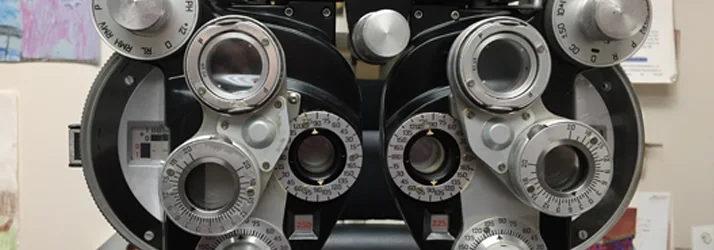Complete Eye Exam for Clear Vision at Enhanced Eyecare NJ, Jersey City, NJ

Clear vision is essential for everything from reading a textbook and driving a car to recognizing a friend from across the room. Yet, it is easy to take healthy eyesight for granted until a problem arises. Regular, comprehensive eye exams are the single most important step you can take to maintain good vision and prevent long-term eye problems by detecting changes early.
At Enhanced Eyecare NJ, we are committed to providing thorough and accurate eye exams for patients of all ages. Our experienced team is here to guide you on your eye care journey and ensure you have the clear, comfortable vision you need to succeed.
Eye Exams and Their Importance
A comprehensive eye exam is much more than a simple vision screening to see if you need glasses. It is a detailed evaluation of your vision and the overall health of your eyes. During your exam, we look at many different aspects of your ocular function. We will assess how clearly you see at various distances (visual acuity), how well your eyes work together as a team, and how they focus and move. We also evaluate your color vision, depth perception, and peripheral (side) vision.
These exams are vital for everyone, at every stage of life. For children and teenagers, clear vision is fundamental to learning and development in the classroom and beyond. For adults, regular exams are crucial for detecting and managing age-related conditions that can affect vision, such as glaucoma, cataracts, or macular degeneration. Even if you feel your eyes are perfectly fine, an annual exam can uncover underlying issues before they become noticeable. This early detection gives us the best opportunity to treat conditions effectively, protecting your sight for years to come.
External and Internal Eye Evaluations
A complete eye exam checks both the outside and inside of your eyes.
During the external exam, we look at visible parts. We examine your eyelids and eyelashes for signs of irritation, inflammation, or infection, such as styes or blepharitis. We also examine the conjunctiva (the clear tissue covering the whites of your eyes) and the iris (the colored part of your eye) for any problems.
The internal exam, called ophthalmoscopy, lets us see deep inside your eye, including the retina, optic nerve, and blood vessels. To get a clear view, we may use special eye drops to dilate your pupils. This temporarily dilates your pupils, allowing us to see better. This part of the exam is crucial for identifying early signs of serious conditions, such as glaucoma, macular degeneration, and retinal problems. It can also show health issues in other parts of your body, such as diabetes and high blood pressure.
Early Detection of Common Eye Conditions
One of the most important benefits of a regular eye exam is the ability to find serious eye conditions before they cause irreversible vision loss. Many eye diseases develop slowly and without obvious symptoms in their early stages.
Our thorough evaluations can identify:
- Refractive Errors: Conditions like nearsightedness (myopia) and farsightedness (hyperopia) that cause blurry vision.
- Cataracts: A gradual clouding of the eye's natural lens, which can make vision appear dull, blurry, or faded.
- Age-Related Macular Degeneration (AMD): A disease that affects the macula, the part of the retina responsible for sharp, central vision needed for reading and driving.
- Effects of High Blood Pressure (Hypertension): Changes to the blood vessels in the retina can be the first sign of high blood pressure in the body.
Early detection allows us to recommend timely treatments, prescribe corrective lenses, or suggest important lifestyle changes to protect and preserve your sight.
The Role of Eye Exams in Diabetic Eye Health
Your eyes provide a unique, non-invasive view of your circulatory system. This makes a comprehensive eye exam a powerful tool for monitoring overall health, especially for individuals with systemic conditions such as diabetes. High blood sugar can damage the tiny, delicate blood vessels in the retina, leading to a condition called diabetic retinopathy.
If left untreated, it can cause severe vision loss and even blindness. During your exam, we carefully check for any signs of this condition. People with diabetes are also at a higher risk of developing cataracts and glaucoma. For this reason, we recommend that anyone with diabetes have a comprehensive dilated eye exam at least once a year.
Glaucoma Monitoring and Management Through Eye Exams
Glaucoma is a serious eye disease that damages the optic nerve, the vital link between the eye and the brain. It is often called the “silent thief of sight” because it typically has no symptoms in its early stages. The disease slowly degrades your peripheral vision first, and by the time you notice changes, significant and irreversible damage has already occurred.
A regular eye exam is the key to detecting glaucoma early. During your visit, we will perform several tests to check for it, including measuring the pressure inside your eyes (tonometry), examining the optic nerve for signs of damage, and testing your peripheral vision. If glaucoma is detected, we can manage it with treatments like prescription eye drops or other procedures to prevent further vision loss.
Advanced Eye Exam Technology for Accurate Assessments
Modern eye exams use advanced tools to make testing faster, easier, and more precise.
Some of the tools we use include:
- Digital retinal imaging: Captures detailed pictures of your retina for early disease detection.
- Optical coherence tomography (OCT): Helps see layers of the retina for conditions like glaucoma or macular degeneration.
- Visual field testing: Checks your peripheral vision for early signs of eye disease.
Using these tools ensures a thorough exam. It helps us track changes in your eyes over time and make accurate recommendations. Advanced technology makes exams comfortable, safe, and reliable for patients of all ages.
Meet Dr. Balvinder Bharj
Dr. Balvinder Bharj is an board certified optometrist with over a decade of experience helping patients achieve clear and comfortable vision. She specializes in managing and treating a wide range of ocular conditions, including dry eye disease, eye allergies, styes, and red eyes, as well as monitoring for cataracts and glaucoma. Having practiced in diverse settings across New York, Los Angeles, and New Jersey, Dr. Bharj brings a wealth of experience to her patient care.
She earned her bachelor’s degree from Penn State University and her Doctorate of Optometry from the IAUPR School of Optometry. Known for her thorough and caring approach, Dr. Bharj works closely with each patient to find the most effective treatment solutions for their unique eye health needs.
Payment and Insurance
At Enhanced Eyecare NJ, we strive to make your visits easy and worry-free. We accept many insurance plans, including:
- Aetna
- Cigna
- Horizon
If you have questions about your coverage or benefits, our team is here to help you verify your plan details.
OFFICE HOURS
Monday
10:00am - 6:00pm
Tuesday
10:00am - 6:00pm
Wednesday
10:00am - 6:00pm
Thursday
10:00am - 6:00pm
Friday
10:00am - 6:00pm
Saturday
10:00am - 4:00pm
Sunday
Closed
Enhanced Eyecare NJ
Lenscrafters inside MACY's
20 Mall Dr E floor 2
Jersey City, NJ 07310



